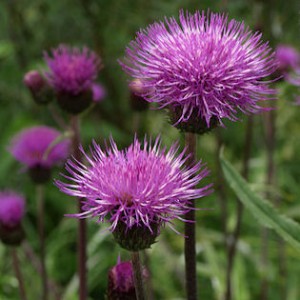 Although the song “America the Beautiful” praises amber waves of grain, when I was a little girl I wasn’t much impressed by that image and would have preferred a field of blooming thistles instead, with their pink tufts like cotton candy waving atop their prickly stems. Admittedly, as a privileged child of the modern age I never thought about where the bread that my mother bought at the supermarket had come from. The beauty that a nation of small farmers would have seen in a good harvest, on which they relied to get through the long hard winter, was quite beyond my understanding as I carried my brown paper lunch bags to school every day and sat at the cafeteria tables with my neatly quartered white-bread sandwiches.
Although the song “America the Beautiful” praises amber waves of grain, when I was a little girl I wasn’t much impressed by that image and would have preferred a field of blooming thistles instead, with their pink tufts like cotton candy waving atop their prickly stems. Admittedly, as a privileged child of the modern age I never thought about where the bread that my mother bought at the supermarket had come from. The beauty that a nation of small farmers would have seen in a good harvest, on which they relied to get through the long hard winter, was quite beyond my understanding as I carried my brown paper lunch bags to school every day and sat at the cafeteria tables with my neatly quartered white-bread sandwiches.
Now, as an adult, I’m aware of many more social, economic and historical connections than would ever have occurred to me in those long-ago days; but I have grown so accustomed to letting my thoughts run in these abstract patterns that it often takes a conscious effort to perceive the beauty in the everyday things that delighted me as a child. These days I don’t notice thistles much, except at this time of year, when the ones I find in my yard need to be sprayed to prevent them from growing back in the spring. Thistles are incredibly invasive, and they’ll soon take over a suburban lawn or flower garden if they are not kept in check.
As much as thistles and other weeds seem like invaders in our yards, though, we’re really the interlopers on land that spent millions of years as prairie or forest. It’s almost comical how jealously we guard our neatly constructed landscapes, battling Nature at every turn as we impose our cultural notions of proper order on a world that has its own ideas. Much the same sort of absurdity manifests itself in society’s insistence on forcing the vast diversity of human thought into the narrow range it deems normal. Such an attempt might fairly be described as hubris, in the classical sense of the word: humanity arrogating to itself the authority to make judgments that belong in the realm of the gods.
Modern humans have a tendency, as Andrew Lehman put it in his article Accompanying the Metaphor, to confuse the map with the territory. Instead of simply experiencing the world on its own terms as our ancestors did, or as we often did as children, we spend so much time thinking in abstractions and metaphors that we start to lose track of the underlying reality. Whatever we encounter has to be neatly categorized and put into whatever niche our society has assigned to it. We delude ourselves that everything is within our power to control.
And when she notices our folly at all, Gaia chuckles to herself in the whispering wind, scattering her thistle seeds far and wide.
Gwen McKay on 09/15/10 in featured, Society | 3 Comments | Read More
Comments (3)


I don’t know that we’ll be at this house long enough for her to complete the project, but the like-minded woman I married has informed me she is determined to relieve me of the necessity of mowing the lawn, by turning it all into garden. She has made a good start, digging up at least a little sod each year. This summer we have hosted two sprawling, volunteer pumpkin plants which I simply learned to mow around. And down the street, too, there is a beautiful yard — at the house, so we hear, of a gay man — which had already been relieved of its grass before we moved in.
The phrase “competitive lawn care” has always both amused me and reminded me of what I find disturbing about suburban culture. If I remember right, lawns were once maintained only by the kings and noblemen who could afford to employ groundskeepers; the American Lawn was supposedly a reaction to this, a form of democratized landscaping — but the ironies, as you point out, abound.
Be it by a devotion to a Kentucky Bluegrass monoculture or to one of “normality,” there’s more than one way to make ourselves into “subjects” all over again, eh?
Although my husband tends toward being a Kentucky Bluegrass devotee and wouldn’t stand for having all the sod dug up, I’ve been chipping away at it each year like your wife by adding more bushes and flowers around the edges.
My first order of business upon moving into our new house was to dig up the entire front lawn and put in a flower garden. Then, last summer, I dug up the side lawn for a vegetable garden. We now have just a tiny bit of grass between the vegetable and herb gardens. I think it may go next spring.
To my understanding, the origin of the lawn was that it was a symbol of being so rich that you didn’t need to use the land for growing vegetables or raising farm animals. Even before I knew this, I’d always disliked lawns. They were always just a little too “neat” for me.